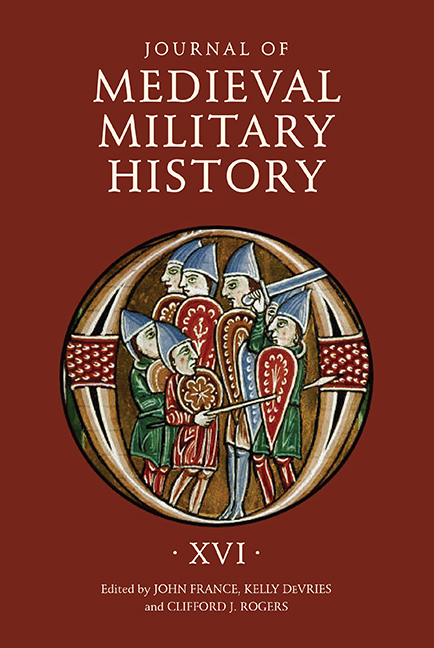Book contents
- Frontmatter
- Contents
- List of Illustrations
- 1 In the Field with Charlemagne, 791
- 2 The Recruitment of Freemen into the Carolingian Army, or, How Far May One Argue from Silence?
- 3 Baybars’ Strategy of War Against the Franks
- 4 Food, Famine, and Edward II's Military Failures
- 5 The Impacts of Warfare on Woodland Exploitation in Late Medieval Normandy (1364–1380): Royal Forests as Military Assets during the Hundred Years’ War
- 6 Exercises in Arms: the Physical and Mental Combat Training of Men-at-Arms in the Fourteenth and Fifteenth Centuries
- 7 The Skirmish: A Statistical Analysis of Minor Combats during the Hundred Years’ War, 1337–1453
- 8 Yron & Stele: Chivalric Ethos, Martial Pedagogy, Equipment, and Combat Technique in the Early Fourteenth-Century Middle English Version of Guy of Warwick
- 9 Reframing the Conversation on Medieval Military Strategy
- List of Contributors
- Journal of Medieval Military History 1477–545X
2 - The Recruitment of Freemen into the Carolingian Army, or, How Far May One Argue from Silence?
Published online by Cambridge University Press: 09 October 2019
- Frontmatter
- Contents
- List of Illustrations
- 1 In the Field with Charlemagne, 791
- 2 The Recruitment of Freemen into the Carolingian Army, or, How Far May One Argue from Silence?
- 3 Baybars’ Strategy of War Against the Franks
- 4 Food, Famine, and Edward II's Military Failures
- 5 The Impacts of Warfare on Woodland Exploitation in Late Medieval Normandy (1364–1380): Royal Forests as Military Assets during the Hundred Years’ War
- 6 Exercises in Arms: the Physical and Mental Combat Training of Men-at-Arms in the Fourteenth and Fifteenth Centuries
- 7 The Skirmish: A Statistical Analysis of Minor Combats during the Hundred Years’ War, 1337–1453
- 8 Yron & Stele: Chivalric Ethos, Martial Pedagogy, Equipment, and Combat Technique in the Early Fourteenth-Century Middle English Version of Guy of Warwick
- 9 Reframing the Conversation on Medieval Military Strategy
- List of Contributors
- Journal of Medieval Military History 1477–545X
Summary
The Carolingian rulers kept armed forces busy year after year throughout the eighth century and into the ninth. With his troops, Charlemagne completed the conquest of Aquitaine, annexed Lombard Italy, invaded Spain, seized control of Bavaria, plundered the Avars, and, not least, conquered Saxony and forcibly converted its population to Christianity. He doubled the extent of the lands he inherited. These are well-known facts. Einhard filled a large part of his biography with a rundown of Charles's campaigns, and everyone reads Einhard. Thousands of Carolingian subjects served in Charles's and his predecessors’ armies, crisscrossing the kingdom to carry out their leaders’ wishes to subdue enemies. Yet the mechanisms that called them to service, the rations that fed them, and their exertions in reaching the battlefronts and returning home, have drawn little attention in recent years. The conquests are familiar, but not the means by which they were achieved.
Much though armies were a weighty presence in the Carolingian world, they put us in mind, at present, of a “strangely neglected topic.” There is recent specialist work (notably the articles by Timothy Reuter, cited in n. 25 below), but general accounts are muted. Three comprehensive books on the Carolingian empire – by Heinrich Fichtenau, Jacques Boussard, and Rosamond McKitterick – do not include any discussion of the army. The same omission occurs in Donald Bullough's fine The Age of Charlemagne. Hans-Werner Goetz, writing on “Social and Military Institutions” in the would-be authoritative The New Cambridge Medieval History, allots the army a few lines only, and perpetuates the discredited idea that stirrups contributed to its success. In the same volume, Janet Nelson writes on “Kingship and Royal Government” with only a fleeting reference to an army. Chris Wickham's The Inheritance of Rome, 650 pages destined for a general audience, disposes of the Carolingian army in little more than a single page; his longer Framing the Early Middle Ages grants it barely ten lines, though somewhat more than is given to the same subject in Rudolf Schieffer's Carolingian volume of the standard Gebhardt Handbuch. Comparably slight attention is paid to the subject in major books by Johannes Fried and Dieter Hägermann.
The practice of passing lightly over Carolingian military institutions is not new.
- Type
- Chapter
- Information
- Journal of Medieval Military History , pp. 17 - 34Publisher: Boydell & BrewerPrint publication year: 2018



